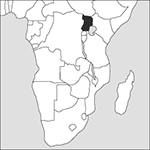
Source: MAPS IN MINUTES™ © RH Publications (1997)
Capital:
Kampala
Area:
241,038 sq km (93,065 sq miles)
Population:
34,758,809 (2013 est)
Currency:
1 Uganda shilling = 100 cents
Religions:
Roman Catholic 41.9%; Anglican 35.9%; Muslim 12.1%; other Christian 6.1%
Ethnic Groups:
Baganda 16.9%; Banyakole 9.5%; Basoga 8.4%; Bakiga 6.9%; Iteso 6.4%; Langi 6.1%; minority groups
Languages:
English (official); Ganda; Swahili; Arabic; local languages
International Organizations:
UN; AU; Commonwealth; Non-Aligned Movement; WTO
A landlocked country in East Africa, bounded by Sudan on the north, Kenya on the east, Tanzania and Rwanda on the south, and the Democratic Republic of Congo on the west.
Physical
Uganda’s tropical climate is alleviated by its height, most of it being over 1000 m (3300 feet) above sea-level. Between lakes Victoria (the source of the Nile), Kyoga, and Albert in the southern half of the country are hills with richly fertile slopes and valleys. The savannah country in the north supports cotton and grain.
Economy
Agriculture employs four-fifths of the workforce, and coffee accounts for the majority of export earnings. Other important exports are fish and fish products, tea, cotton, flowers, horticultural products, and gold. Industry concentrates on agricultural processing, textiles, cement, and steel. Oil reserves have been identified but not exploited.
History
During the 18th and 19th centuries the kingdom of Buganda on Lake Victoria became the dominant power in the area under its kabaka (king) Mutesa I. He welcomed the explorers Speke and Stanley, hoping for protection against Arab slave and ivory traders. Following Mutesa’s death tensions developed between Christians and Muslims, and also between British and German interests. In 1890 there was an Anglo-German agreement that the area be administered by the British, and the newly formed British East Africa Company placed Buganda and the western states Ankole and Toro under its protection. In 1896 the British government took over the protectorate. After World War II nationalist agitation for independence developed, with Mutesa II being deported. In 1962 internal self-government was granted. Uganda was to be a federation of the kingdoms of Ankole, Buganda, Bunyoro, Busoga, and Toro. In September the Prime Minister, Milton Obote, renounced this constitution and declared Uganda a republic. Mutesa II was elected first President, but in 1965 he was deposed by Milton Obote, who became President himself, only to be deposed in turn by General Idi Amin (1971). Amin’s rule was tyrannical and racist, including the expulsion of Uganda’s Asian residents, an economically vital group of entrepreneurs. In 1980, after the invasion by Tanzanian forces and Ugandan exiles, Amin fled the country. Obote returned in 1981, but his failure to restore order led to a coup in 1985, the resulting military regime being overthrown by the National Resistance Army of Yoweri Museveni, who became President in 1986. Under his presidency Uganda tried to recover from the disastrous years of 1971–80, which had ruined the economy and cost hundreds of thousands of lives. Extensive loans by the World Bank and IMF required demobilization of the armed forces. However, with growing insurgence in the north of Uganda during 1995–96 by the terrorist group, the Lord’s Resistance Army, military strength has had to be increased once more. The ban on political parties, imposed when Museveni took power, was renewed in 1992 and enshrined in a new constitution in 1995. In 1994, non-party elections to the Constituent Assembly were won by Museveni’s supporters. Museveni won the country’s first presidential election in 1996 and was re-elected in 2001. Following a referendum on the issue in 2005, a multiparty system was introduced; Museveni was re-elected under the new system in 2006, 2011, and 2016, however observers criticized the voting process and the arrest of his main rival Kizza Besigye.
- Sophia (1630–1714)
- Sophia, Electress of Hanover (1630–1714)
- sophismata
- Sophists
- sophists
- sophrosynē
- sorbitol
- Sorby, Henry Clifton (1826–1908)
- SORCE
- sorcerer's apprentice mode
- Sordes pilosus
- soredium
- Sorel, Georges (1847–1922)
- Sorensen distance
- Soret effect
- Sorge
- sorites paradox
- sorosilicate
- sorosis
- sorption
- sorption pump
- SORT
- sort
- sortal
- sorted biosparite